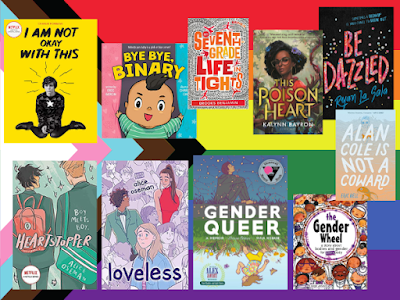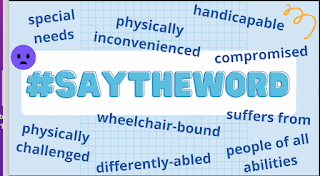Karol Ruth Silverstein (she/her/disabled) has been an active member of the SCBWI for over 20 years. Her debut young adult novel,
Cursed (Charlesbridge Teen), was loosely drawn from her experience of being diagnosed with juvenile arthritis at thirteen and won the prestigious Schneider Family Book Award in 2020. Karol has identified as disabled since the age of 21 and is active on the Writer’s Guild of American West’s Disabled Writers Committee.
Karol asks us to change how we think, talk, and write about disability starting with our word choices. She's aware she does not need to convince this audience on the importance of language, that when we consistently use stigma-enforcing language it reinforces and internalizes that stigma in its readers.
As Karol revised her Cursed manuscript, she herself was reticent to call her main character disabled, but as she looked at all of the things the character was living through on a daily basis, Karol realized that it was an accurate description, even if the character herself wouldn’t have used that word for herself.
The preferred term is 'disabled' and Karol shares many examples of how the world is often treating people and viewing and describing things through an ableist lens:
Karol says as long as we continue to ‘cringe’ at using the word ‘disabled,’ that a child with a disability perceives that not mentioning it means there is something wrong with being it. Karol wants us to #saytheword rather than all of these euphemisms, the word we should be using is disabled.
She also understands that we don’t know what we don’t know—but that a person's best course of action is not to argue or make excuses, but to admit it, apologize, and do better—Lizzo being a great example of this when she apologized and then rerecorded one of her songs to omit a derogatory term.
Children's book creators have both a responsibility to model good behavior in some or all of our characters while also creating authentic characters. Karol always wants to be a part of the solution, so for her she tries to model the good behavior and only let characters exhibit inappropriate language/ignorance if it’s necessary to the story.
The words lame, crazy, and insane are all also problematic in regards to mental health and something to move away from, a mistake Karol made herself in one of her books. She sees now those word choices could be deemed lazy writing anyway, and it was something she wanted to rectify in the reprints. See how fully replaceable crazy and insane are in the paperback edit of Karol’s book:
Cultural competency readers for all:
Karol has arthritis, as does her main character in
Cursed, but Karol still had a teen reader with arthritis as well as a doctor specializing in its treatment read her work for a present-day lens on what teens today are experiencing with diagnosis and treatment. Disability is tough to read for because each disability is so different. She recommends contacting hospitals and parent groups and that authors or their publishers should pay for a reader like this once a book is under contract.
In closing, Karol urges everyone to also check out
Stella Young’s TED Talk. It's linked here as well as in the handout for Karol's session that will be available when the recorded version of the session is posted in a few days.





















































